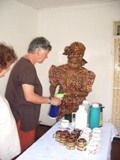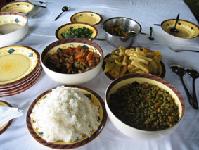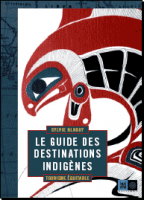Text : Métilde Wendenbaum, Photos : Harro Boekhold

The Chagga tribe lives on the lush slopes of Mount Kilimanjaro since centuries. In the past, they used to hunt and make war against the Maasai among others. Since the German colonisation and then later with the English colonisation in the early 1900s, they started planting coffee. Today, the Chagga people wield significant political power in Tanzania because they are likely to have had more Western education than other Africans. Their involvement in coffee production and export business accounts for their influence as well. But since the liberalisation of the world coffee market the coffee prices have sadly dwindled : it became difficult for smallholders to maintain their way of life. A brand new community-based venture has then been specifically created in collaboration with the regional coffee cooperative KNCU in order to bring in extra income through tourism to the small-scale _ coffee-farmers in the area.
The community-based-tourism project called "Kahawa Shamba Coffee Tour" (“Kahawa Shamba” means coffee farm in Swahili), allows tourists visiting characteristic coffee farms which belong to the village cooperatives of the Kilimanjaro Native Cooperative Union (KNCU). The farmers themselves have developed an interesting program for tourists during one afternoon (approx. 3 hrs).
Visitors will become familiar with the whole process of coffee production : from the explanation about coffee while visiting the plantation to the concrete picking up of coffee berry from the trees by the tourists when ripe. Visitors will discover the different steps of the coffee production occurring after the picking : pulping, drying, curing, weighing, hulling, and grading (by size, density & colour). Once the beans are sorted and rated for quality, they are ready to be sold at auction. Bags will eventually later be shipped likely to Germany, Japan, the United States, or perhaps to any number of Arab nations. 90% of all the coffee produced in coffee producing nations is exported.
Visitors will also be given explanation about organic treatment of the coffee trees and the Fair Trade program of KNCU. Coffee, which is organically grown, goes through the same processing as non-organic beans, but are handled in a separate area, and treated according to special standards.
The tour will end with a coffee drinking ceremony at the Kahawa Shamba. Women of some of the local families have also been trained to make a variety of dishes, and also add their own expertise in preparing tasty local stews. The people of the Chagga tribe who live in the area around the mountain generally build homes with bricks and cement these days, but a few of the traditional homes are still maintained in this community on the edge of the mountain.
The goal of the project is to lead to more awareness for the sustainable production of coffee, both at the producer and the consumer side. Furthermore the income from the Coffee Tours (tourists pay a fixed fee) will be straightly directed to the local community fund. The village cooperative itself will decide on how to spend income from the coffee tour. One village cooperative launched the idea to construct their own nursery for organic grown coffee seedlings.
Location :
North, in the Kilimanjaro region along the border with Kenya ; 640 km. (8 hrs) from Dar es Salaam ; 45 minutes from Kilimanjaro International Airport ; 30 minutes from Moshi town.
Contact

Mr. Emilson Malisa
KNCU Fair Tourism
Old Moshi road plot 33-34-1
Tel. : +255-748517995
Fax : +255-272754204
Email : kncu@kicheko.com
Internet : www.kncutz.com/Products/products_page_four.htm
CONTOUR Projects
Aux Pays Bas,
Tel. : +31-302919941,
Emaill : info@contour-projects.com
Languages : Swahili and English.
Tribes travel

12 The Business Centre,
Earl Soham, Woodbridge,
Suffolk IP13 7SA. UK
Tel : 01728 685971
Fax : 01728685973
Email : info@tribes.co.uk
http://www.tribes.co.uk/countries/tanzania/accommodation/kahawa_shamba.html
Cultural Information
The story wants that a secret network of tunnels and caverns connects the huts where Wa-Chagga (plural of "Chagga") live.
Their conical huts, woven of thatch and sealed with mud, are a little like subway stations in the small settlements where they live on the lower slopes of Mount Kilimanjaro in Tanzania. The Chagga people have lived for centuries at the base of Kilimanjaro, yet they formerly had no desire to climb it, believing it was full of evil spirits. They live low enough on the Kilimanjaro to be in a different ecosystem : rainforest climate of warm days and long growing seasons, aided by rich terra cotta coloured volcanic soil. The Chagga people historically have not had warm clothing. Even today, Chagga porters who assist climbing parties up the mountain tend to be scantily dressed by the Chagga porter standards of American mountaineering.
Originally Wa-Chagga lived, hunted and made war against each other as thirty separate chiefdoms. When game became too scarce to hunt, they cut down some of the trees on the lower slopes and divided their land into small plots to grow fruits and vegetables. Under colonial rule by the Germans and then later by the English in the early 1900s, they started to plant coffee. Today, the Chagga people wield significant political power in Tanzania because, like members of the Haya tribe, they are likely to have had more Western education than other Africans. Their involvement in coffee production and export business accounts for their influence as well.
Since end of 2003 they developed tourism activities in order to inform visitors about the hard work from the farmers that goes into coffee growing.
Types of Tours
Type of clients : families with children, seniors, groups
Best season : best from about July to October (coolest months) but trips can be arranged at any time of the year.
Duration of stay : Kahawa Shamba is ideal for those interested in 6 day-culture tours as well as active types that want to acclimatise for 1-2 days before Kilimanjaro, or as part of a longer itinerary.
Short description of the place and services offered, highlights :
The surrounding area is lush and fertile, with abundant valleys, gorges, rainforest, cloud forest and numerous waterfalls. It is ideal country for exploring on foot, and a variety of guided walks are possible varying in duration from 1 hour up to 2 days. These include trips along the Weru Weru river valley or on the foothills of Kilimanjaro to the discovery of waterfalls and suspended bridges, cultural tours, and visits to nearby caves once used by the Chagga to shelter from Maasai raiders. The river also offers some trout fishing as trout were introduced to these waters back in colonial times.
Services : From June 2005, the first Kahawa Shamba campsite will be operational. In due time full board accommodation will be ready. It is also possible to hike accompanied by local guides. At this moment there is very few public transport available
Map : The community located in the western area of the Kilimanjaro, near Machame.
Photo : 1-2 photos to be provided
Name of the place : several places ; the purpose of the project is to involve several of KNCU’s village cooperatives in developing tourism activities
Types of Tours Offered
In the region:Hiking routes, traditional music events, local blacksmith shop
Recommended Tour :

Title : Kahawa Shamba Coffee Tour
Duration : 3-4 hours
Type of activities : guided visit of the coffee farm, coffee degustation & lunch
Season of travel : (coolest months) but trips can be arranged at any time of the year.
Total price : The total price per person is US 15. This includes local lunch at the farm, excursion program guided by local farmers, coffee drinking with the coffee farmer family. Transportation to and from the farm is not included.
Accommodation : From June 2005, the first Kahawa Shamba campsite will be operational. Tourist groups up to 20 persons can stay overnight at the Kahawa Shamba with their own tents.
The community will use the income of the campsite to (partly) invest in the construction of basic tourist accommodations, based on traditional building (Chagga style). In this way they are/will feel themselves owner of the project.
Services offered : tent pitch, lunch, guiding service
Booking procedure : Direct with KNCU Fair Tourism or via touroperators, because the coffee tour will be included in several touroperators travel itineraries soon.
Access : the Coffee Tours are situated at a 30-45 minute drive from Moshi town in the Kilimanajro area. Moshi is close to Kilimanjaro International Airport (approx. 45 minutes)
Size of the group : 5-12 persons
Conditions required : all public and ages
Climate conditions : In Kahawa Shamba the coolest months are from June to October, the warmest from December to March. Short rains are from about November to December, long rains are from about March to May (early June).
Responsible travel


